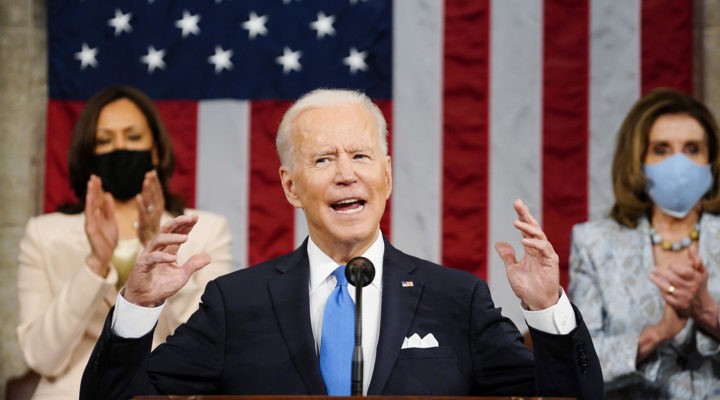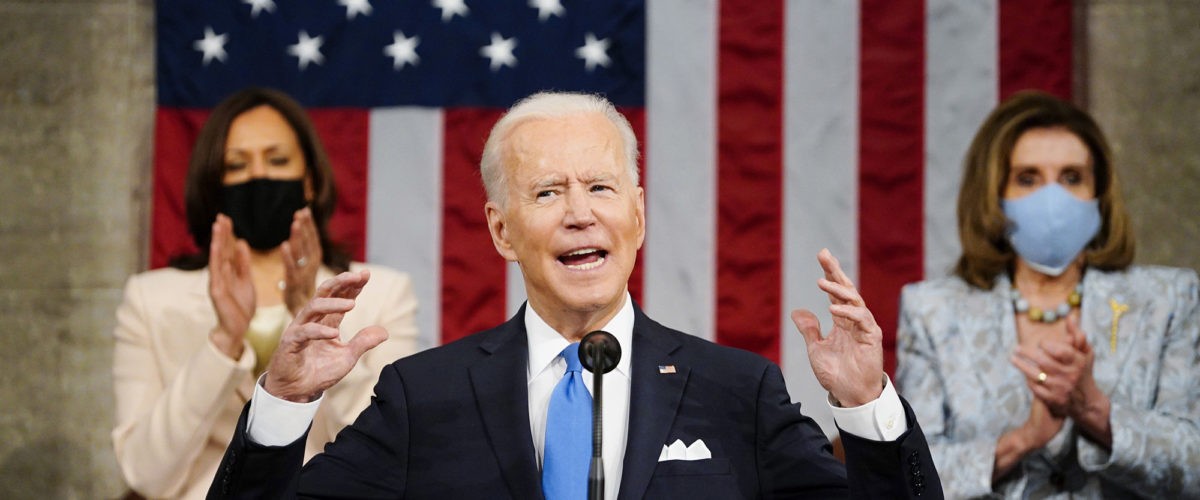Long ago, my fourth grade teacher warned me: “Jordan, if you want to be a preacher some day you have to give up on politics. Religion and politics just don’t mix.”
I always was a good student, but maybe not the best listener. That’s why last Wednesday evening I was glued to the television watching President Joe Biden deliver his first address to a joint session of Congress. Speeches like the one on Wednesday are tough for any president. President Biden’s delivery was solid, but what made the speech significant was what he said he hoped to accomplish.

Jordan Conley
The president called for ending childhood poverty in this country. He affirmed health care as a human right, while reminding us that we are called to welcome the stranger. He demanded that our country “root out systemic racism” and called for feeding hungry Americans. Biden proposed expanding access to education, including free community college, so that more Americans can attain the skills they need to make a decent living for their families.
If I didn’t know any better, I would have thought the president heard my pastor’s regular Sunday morning benediction. Each week, the benediction sends us out to “feed those who come to us hungry” and to “stand up for what is right and just.”
Biden is the first president in years to attend weekly church services. He speaks openly about how his faith has helped him through the tragedies he’s endured. Standing in a chamber that was stormed just a few months prior by insurrectionists wielding the Christian flag, Biden sounded like one who heard Jesus when he said, “Go into all the world and proclaim the gospel to the whole creation.” He sounded like one living that familiar verse that echoes, “They’ll know we are Christians by our love.”
To be clear, this was no regular speech by a run-of-the-mill politician. I heard in Biden’s speech an evangelistic call to join the divine in the work of bringing about the good news of the kingdom of God. To the senior who has to choose between purchasing medication or groceries, lower cost for medicine is good news. To the single mother who works an extra shift just to be able to afford her child’s day care, universal preschool is good news. To the miner in Eastern Kentucky who is one layoff away from financial disaster, tuition-free community college is good news.
“I heard in Biden’s speech an evangelistic call to join the divine in the work of bringing about the good news of the kingdom of God.”
To my ears, the president wasn’t just giving a speech after his first 100 days in office. He was outlining his evangelistic work as president, joining with Jesus in bringing God’s kingdom to those in desperate need of good news.
Before he even left the platform, pundits and political opponents alike started to name all the reasons the president’s agenda would not be passed. Besides the daunting task of getting 60 votes in the Senate, many were calling Biden’s agenda “fiscally irresponsible” and “radical socialism.”
“Fiscally irresponsible” is a term used to raise objections when government funds are allocated to assist the poor, the vulnerable or the working class. After all, both political parties regularly break records for spending. If the government never spent any money, then there would be no military, no interstate highways, and so on. The government spends money no matter who is president. The question is, “To what end will the money be spent?”
The services government provides to working people are not handouts, although they may be perceived as such by those who never have needed to rely on such services. When I hear wealthy representatives (who vote to spend money in a myriad of ways) bemoan Biden’s proposals as too costly, it strikes me as inauthentic.
Typically, we associate cost with worth. If we say something is too expensive, then what we’re really saying is it isn’t worth the money we’re putting out. We can’t see the value. My fear is that these folks aren’t concerned about cost; they simply do not see their fellow Americans as being worthy of the investment this country can afford.
“President Biden had an old-fashioned altar call. He called for revival. He challenged this country to bring the kingdom of God to the hungry, the poor, the oppressed.”
This is what Biden tried to convince Americans of on Wednesday night. Everyone is worth it. Everyone is worth having health care that can make the difference between life and death. Everyone is worth education that can break the chains of poverty. Everyone deserves a refuge, a balm in Gilead.
As best as I could tell, there was no tent in the House chambers on Wednesday evening. There was no pianist to play “Just as I Am,” but make no mistake: President Biden had an old-fashioned altar call. He called for revival. He challenged this country to bring the kingdom of God to the hungry, the poor, the oppressed.
He mixed politics and religion by calling for legislation that would bring good news to many. He invited folks to the banquet table who aren’t used to getting an invitation.
The breadth of the invitation ruffled some feathers. Radical hospitality isn’t always popular. But it is worth it because humanity is worth it. A man from Galilee told us the price was worth it long ago, and on Wednesday night, a man from Scranton reminded us that it is still worth it.
That’s how politics and religion can come together to make a real difference in our world. They should be mixed up together. If the combination is just right, we might find ourselves on an evangelistic mission with the divine, mixing faith and politics to bring good news, make more room at the table, and affirm the worth of all.
Jordan Conley hails from Eastern Kentucky and now lives in Louisville, where he’s a Baptist minister, member of Crescent Hill Baptist Church, a student at Baptist Seminary of Kentucky and funeral director.
Related articles:
How I learned to care about social justice growing up Southern Baptist in Oklahoma | Opinion by Mark Wingfield
Making the gospel only about private righteousness is too easy | Opinion by Doyle Sager
Three steps toward contemplation in social justice action | Opinion by Julie Pennington-Russell


